When Online Threats Become Real. (It’s Not Just Trolling.)

(Note: this piece does not link to any of the shooter’s video or manifesto directly, but some of the news sites that I link to may do so. A few include screencaps of his 4-chan forum discussions. Please click with caution.)
49 people died yesterday, gunned down in two mosques in coordinated attacks across New Zealand. The intricacies of time zones and the international date line mean the date of their deaths was actually today, Friday the 15th. Waking up on this day here in the states with knowledge of what occurred feels strangely perverse, as though someone should have been able to stop the attacks through some sort of temporal witchcraft.
And in truth, it seems that someone should have been able to stop all of it. The shooter’s plans were laid out specifically on 4-chan. His manifesto (which I am not going to quote from directly, because he needs no more amplification and if you wish to read it, it is disturbingly easy to find – the UK’s Daily Mail even allowed visitors to download it directly) is peppered with inside jokes from the forums. His justification for the shooting is a mix of white supremacist rhetoric intermingled with “shitposting” (intentional misdirection and nonsense arguments meant to to obfuscate the truth and confuse or frustrate anyone who isn’t in the know) making joking references to the video games while he describes his motivations behind an attack that would leave more than four dozen people dead. It was a hate crime, acted out by an Islamophobe who wanted to be an Internet star.
While en route to the shooting, the shooter played an anti-Muslim song that was used in a propaganda video made by members of the Serbian Army as a tribute to war criminal Radovan Karadžić. The posters on 4-chan laughed at this detail and lauded his actions. They hailed him a hero. They anxiously looked forward to the attack and expressed excitement when it finally happened (“OP fucking delivered” one wrote, as though it was an innocuous reddit thread). They called for someone to “redeem” France in the same way.
He would publish a livestream of the attacks on social media (video would later be published to YouTube, Twitter, Reddit, Facebook, and numerous other online platforms). I haven’t watched the footage (and I won’t), but I’ve read that it’s from a first-person angle, a sort of sick parallel to the vantage point you’d see if you were playing a video game. We used to have to work harder at dehumanizing people. The internet has made it shockingly easy.
Most of the websites have scrambled to take the videos down, but they keep reappearing.
This most recent shooting is one in a seemingly endless stream of massacres carried out by another white supremacist angry at people who don’t look or act exactly as he did. They’ve become galvanized and radicalized on various social media platforms where they find like-minded bigots who share their same vitriol. They are terrorists, but that word is rarely used to describe them (particularly here in America, we are loathe to apply the t-word to mass shooters, particularly white ones, because the cognitive dissonance between claiming to fight terrorism while simultaneously embracing easy access to guns and a President who preaches bigotry and xenophobia would simply be too much).
When asked if he supported Trump, the shooter replied: “As a symbol of renewed white identity and common purpose? Sure. As a policy-maker and leader? Dear god no.”
But the President’s rhetoric and the shooter’s are nearly identical. What’s truly alarming is that it is the President who is echoing the shooter after the attack:
“We are experiencing an invasion on a level never seen before in history.”
“People hate the word invasion, but that’s what it is.”
Two quotes about immigrants in the past 24 hours. One from the US president, one from a document justifying a white supremacist terror attack.
— Lois Beckett (@loisbeckett) March 15, 2019
It’s been impossible for me to separate the conversations that the shooter had prior to the attack from the vitriol that plays out daily on social media platforms. The attacks themselves seem specifically engineered to be shared on social media. It creates a Catch-22 for anyone wanting to address the issue – because even condemning the shooter’s actions plays into his attention-seeking goals. The refrain “don’t feed the trolls” is repeated ad nauseam whenever the discussion of online hate comes up. And while we can (and arguably should) refuse to watch videos of the slaughter, or promote a manifesto of hate that the writer so clearly wanted spread, avoiding talking about online abuse, and the galvanization of hate, and the litany of death threats that have become commonplace for so many of us … well, that doesn’t seem the correct response, either. We need to address this garbage in order to fight it.
I’ve spent the last year gently wading into the cesspool of online hate and abuse (I’ve been giving talks about it and doing some research, ostensibly for a new book), although consistently doing so from the lofty position of privilege that I have as an able-bodied, college-educated, cis-gendered white American woman. I’m usually only ever a target because I’ve committed the crime of expressing my views while female, because I’ve dared to be happy and in love. This alone is enough to anger some lonely, cave-dwelling troglodyte.
I’ve received death threats and rape threats, had people make light of my brain surgery (and spread the notion that in the aftermath of it, I am mentally unfit), had my Twitter account hacked, received threatening letters at my home, and, perhaps most delightfully, been told that my marriage is fake and that we are destined for divorce (as a result, Rand and I have taken to whispering “sham marriage” to one another at nauseatingly romantic moments). I’ve lost sleep, had my husband install a security system, had to check with event organizers to see what kind of security they offered, and been so frightened by some of this that I haven’t talked about it, because I knew that doing so meant that the people behind it would know that they’d succeeded.
And still, I’ve had it relatively easy.
I’ve never been attacked for my skin color or my ethnicity or my immigration status or my religion or my gender identity or my sexual orientation. The President’s endless Twitter hate-fest never calls me out directly. I walk around in a bubble of relative safety. And I’m still terrified. So I can’t even fathom how people without all those layers of privilege must feel.
The refrain that I’m so often told is that there’s nothing to fear – that online threats are simply that. That the authors of such vitriol and hate are simply blowing off steam, or are merely trolling (a term that I am loathe to use – because it automatically suggests that online abusive behavior is somehow less egregious than it is and puts pressure on the targets of the abuse to solve the problem by perceiving it differently). But yesterday’s attack, and the countless ones that have preceded it (and, I fear, the seemingly endless ones that will likely follow it) have proven that there is no such thing as an “online” threat. A threat made via Twitter is a threat. If a terrorist posts their plans to 4-chan, it is no less potent because of the forum. And everyone who sees their hateful words and laughs along, everyone who cheers the outcome as thought it is a game, is an accomplice.
These platforms are part of why the threats exist in the first place – offering bigots a microphone for their hate, and an eager audience to amplify it. Dismantling toxic communities and banning hateful individuals needs to be a pre-emptive measure and a reactionary one. Take away someone’s platform, and you take away their power.
the two best examples we have of robust deplatorming are Milo and Richard Spencer aka “oh yeah… that guy” there is simply no evidence to suggest it makes them more alluring
— Brandy Jensen (@BrandyLJensen) March 15, 2019
We do need to look at the role that social media platforms play in all of this, and the responsibility they have to all of us. And we need to stop dismissing hate and threats when they appear. No one, absolutely no one, is allowed to say that “it’s just trolling” ever again. We can no longer ignore the relationship between online threats and offline violence, between hateful online forums and real world hate. There is no separation.









